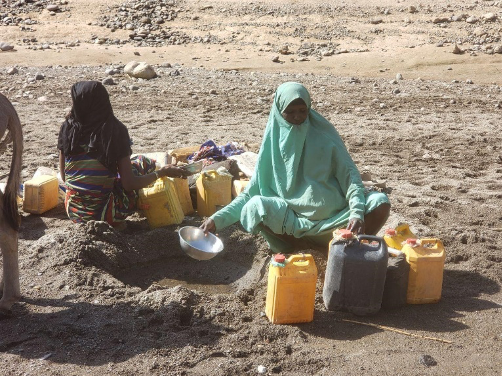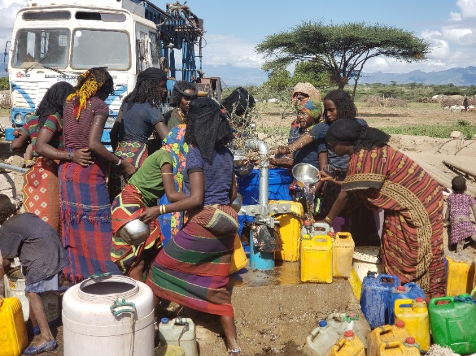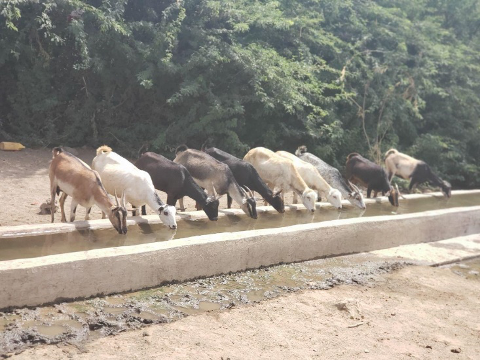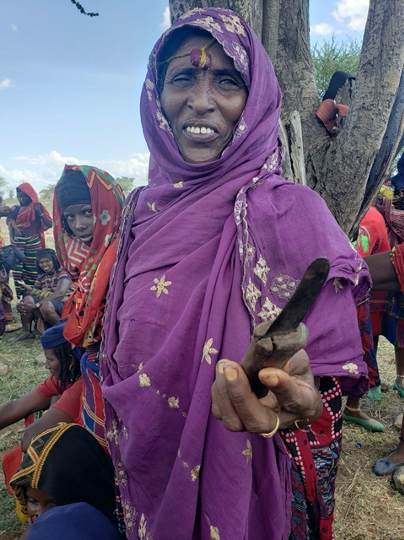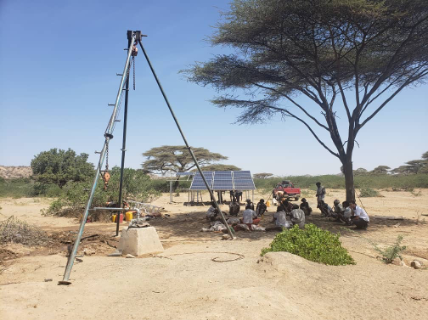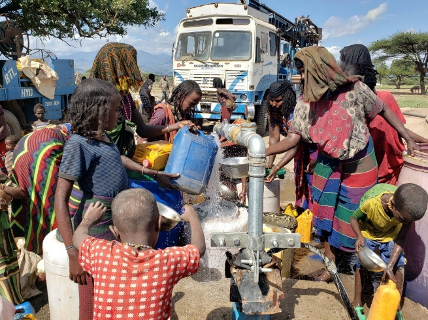WATER PROJECT
This project is part of a two-year project funded by “Bread for the World” focusing on mothers and Child health Care (MCH) and providing potable water for the community of Afar. One of important outcome of the project is to stop Mothers and Childers death in Dulessa district of Afar.
Friendship Support Association, is implementing different projects one of them is a water project. In 2019 we planned to dig two wells 150 meters deep, working with solar power. It took us the whole year to complete the plan. Normally, if everything goes right, it takes up to 3 months. Due to technical and geological issues, we faced challenges that took the whole year. These wells were dug in an area where the people have to walk six hours round trip to fetch contaminated water.
So you can understand that the water source was a long distance away. It was usually the young girls between the ages of 8 and 13 years that went to fetch the water too. We heard many moving stories of tragedies that occurred on those trips.
Sa’ala’s Story
One such story was told to us by Sa’ala, who lost her daughter two years ago. Sa’ala’s daughter was 13 years old. One morning, as usual, she went to fetch water for her household about 5 a.m. She left early so that she would be back before the weather in the desert got too hot. Unfortunately, Sa’ala’s daughter did not return at the expected time. While she was walking to the river she was attacked by a hyena. Only a part of her body was found in the bush. Sa’ala’s tears flowed the whole time she was telling me this horrific story.
Sa’ala continued speaking to me and said, “I am glad now FSA drilled a well in our village so that, in the future, no more girls will be attacked by wild animals. Yet, for me, every time I drink water from this well, I will think of my daughter. I wish she were here so she could see all these blessings came to our door. I wish she could have one cup of water from this clean water. I pray for FSA team and to the donor every day that no tragedy will happen to you, or, to your family, as it has happened to us. You have saved the lives of many people, No more women and girls will die while they are fetching water from a long distance Alhamdulillah (Means thanks to God)!” I left the village that day with a broken heart and deep grief.
FEMALE GENITAL MUTILATION (FGM)
Under “WASH AND HEAL project” trying to address the FGM problem for women themselves, and, as it relates to delivery complications. It is a huge issue because FGM has been widely practiced for more than 10 decades. Many governments and Non- Governmental Organizations have previously tried, in different ways, to stop this practice, but no significant results have been recorded.
Two years ago, in order to tackle the FGM problem, we have done survey with community members and tried to better understand the situation. We learned that 99.1% of the women, in the area where we are working, were reported to be circumcised. More than that 43.0% of the community groups have the intention to circumcise their daughters in the future. We were curious to know what benefits a girl would gain if she is circumcised and asked them the question. The majority, close to 48%, reported that the victim of FGM would acquire some kind of religious benefit that would be given for cleanliness, in order for the girl to get social acceptance, and, the victim (the girl), to have a low sexual desire. The low sexual desire would inhibit infidelity. Some families circumcise their daughters thinking they may not find her a husband if she is not circumcised; others also say that if a girl is not circumcised, the community mocks her and most communities ostracize uncircumcised girls.
Therefore, girls themselves want it to be circumcised in order to get acceptance by the community. Men also want girls they will marry to be circumcised so that they feel proud and are dominant over them. Men think that if a girl is circumcised she will be submissive to her husband and they will avoid the fear of overt sexual behavior (infidelity) by the girl against her husband. Furthermore, some people also believe that the act of FGM is accepted by the Muslim religion.
However, after listening to all this long belief system or mindset, we opened up a community dialogue and teaching time every month and it has been in effect for the last two years. In the beginning, the community rejected the proposal to discuss the matter. Some of the religious leaders especially were upset and assumed that we were forcing them to change a religious practice which Allah allows. It was tense, but gradually, we are educating and even building strong relationships with those who were in opposition. They have become our champions, and are working to see the practice of FGM stopped in our project area.
Bullo’s Story
Bullo Utto was one of the Traditional Birth Attendants who used to be circumcising girls in Garbohaf village. She volunteered for FSA to organize women’s group discussions and several times attended our teaching sessions. Now she is going from house to house to educate her own people about the harm of FGM. Again, in the beginning, some of the women in her village did not agree with her, but in the last two years, she has continued sharing what she has learned and she has convinced many women in her village.
I met Bullo in one of my project sites visit and all of a sudden saw a knife in her hand. As I grew up in a rural area I knew this knife very well. This is a knife that has taken the lives of many women and girls. This is a knife they used to circumcise the girls, and at the same time, Traditional birth attendants used it to deliver babies. They never used sterilizers. However, Bullo proudly told me, “ Guret, you and your people changed our lives. Can you see this knife? I hope you recognize this knife,?” I shook my head and said, “Yes, this is a knife that has been used for delivery purposes and for circumcising the Afar girls.” Bullo, smiled and said, “You are right. It used to be like that, but today the history has changed. We are using this knife to cut a goatskin. Can you see how dirty it looks? We are using it for another purpose. Since we started attending your teaching and community dialogue about harmful traditions, girls are no longer in pain and dying because of FGM. We have been practicing something pharaoh introduced to us. (Pharaoh has been known as evil in Afar). Our ignorance caused us to kill many beautiful girls. I have seen many women die at home by a delivery complication. We thought most mothers and babies died during the delivery time because of the will of God. But now we know it was our ignorance that killed them all. As payment for services, families should give at least a goat for traditional circumcisers to circumcise their daughter, or for a TBA to assist in a birth. So circumcising women was a source of income for most of the traditional circumcisers or TBAs. I was one of those women. Through this teaching, I have been convicted, either I save lives or I get money?
We are also aware that those who have not attended the teaching sessions, as we have, are doing these practices in hiding. Some communities still don't agree to completely stop all forms of circumcision, but they have agreed to stop the severe form. They want to continue doing the “Sunna” type. We will keep teaching and discussing until all the community members understand as we do. We want to teach other Afar women in another locality, (Kebele). “
I thanked Bullo and those who participated in the programme for making a positive change in their community and left the village encouraged and with excitement.
I would like to thank Bread for the World for making difference in the lives of those disadvantaged people groups like Afars.
With gratitude,
Guret Ahmed
Founder and Executive Director



